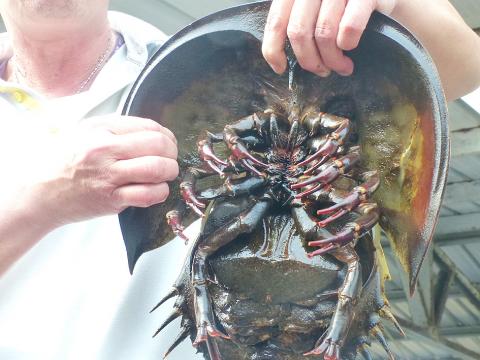The Kinmen County Fisheries Research Institute and National Tsing Hua University are collaborating on a research project aimed at eliminating the need to use horseshoe crab blood in tests to detect bacterial contamination in drugs and intravenous devices as well as other medical items.
A horseshoe crab blood extract, specifically the substance tachyplesin, is used in Limulus amebocyte lysate (LAL) solutions and LAL tests, as well in by in biomedical industries for toxin-free surgical sutures and in the development of wound dressings for burn victims.
However, it takes a liter of horseshoe crab blood to produce 20cc of tachyplesin and research by US universities has shown that horseshoe crabs faced a 2 to 3 percent chance of dying if one-10th of their blood is extracted.

Photo: Wu Cheng-ting, Taipei Times
A research team headed by university professor Margaret Chang (張大慈) aims to employ genetic engineering technology to “plant” genes that produce tachyplesin in the Escherichia coli virus in the hopes that the E. coli virus’ gram-negative nature will stimulate production of tachyplesin.
If successful, the research might remove the need to extract blood from horseshoe crabs entirely, the institute said.
The team arrived in Kinmen on Wednesday to draw the first batch of horseshoe crab blood to be used in research.
Institute staff member Li Chin-chao (黎錦超) said the research would be the first in the nation aimed at helping promote the conservation of horseshoe crabs.
High demand for horseshoe crab blood, coupled with its limited supply put its price at about US$15,000 per liter.

RESOLUTIONS DEBATE: Taiwan’s allies said that UN and WHA resolutions cited by China and other nations ‘do not determine Taiwan’s participation in WHO activities’ A proposal to invite Taiwan to this year’s World Health Assembly (WHA) was rejected on Monday, resulting in Taipei’s absence from the annual meeting for a ninth consecutive year, although partners spoke up for Taiwan’s participation at the first day of the meeting. The first agenda item after the opening was a “two-on-two debate” on a proposal to invite Taiwan to participate at the WHA as an observer. Similar to previous years, two countries made statements in favor of the proposal, while two others expressed their opposition. Philippine Secretary of Health Teodoro Herbosa, president of the 78th WHA, accepted the WHA General Committee’s

Palauan President Surangel Whipps Jr arrived in Taiwan last night to kick off his first visit to the country since beginning his second term earlier this year. After arriving at Taoyuan International Airport at around 6:30 pm, Whipps and his delegation were welcomed by Minister of Foreign Affairs Lin Chia-lung (林佳龍). Speaking to gathered media, the Palauan leader said he was excited and honored to be back in Taiwan on his first state visit to Taiwan since he was sworn in this January. Among those traveling with Whipps is Minister of State Gustav N. Aitaro, Public Infrastructure

Premier Cho Jung-tai (卓榮泰) on Friday laid out the Cabinet’s updated policy agenda and recapped the government’s achievements ahead of the one-year anniversary of President William Lai’s (賴清德) inauguration. Cho said the government had made progress across a range of areas, including rebuilding Hualien, cracking down on fraud, improving pedestrian safety and promoting economic growth. “I hope the public will not have the impression that the Cabinet only asked the legislature to reconsider a bunch of legal amendments,” Cho said, calling the moves “necessary” to protect constitutional governance and the public’s interest. The Cabinet would work toward achieving its “1+7” plan, he said. The

Nvidia founder and CEO Jensen Huang (黃仁勳) hosted a dinner in Taipei last night with key Taiwanese suppliers to celebrate the successful mass production of the company’s new Blackwell AI systems. Speaking to the media earlier yesterday, Huang thanked Nvidia’s Taiwanese partners for their contributions to the company’s ecosystem, while also sharing his plans to meet with Taiwan Semiconductor Manufacturing Co (TSMC) founder Morris Chang (張忠謀). In response to rumors that Nvidia will launch a downgraded Hopper H20 chip for China in July, Huang dismissed the reports, saying, “That is not true.” He clarified that there